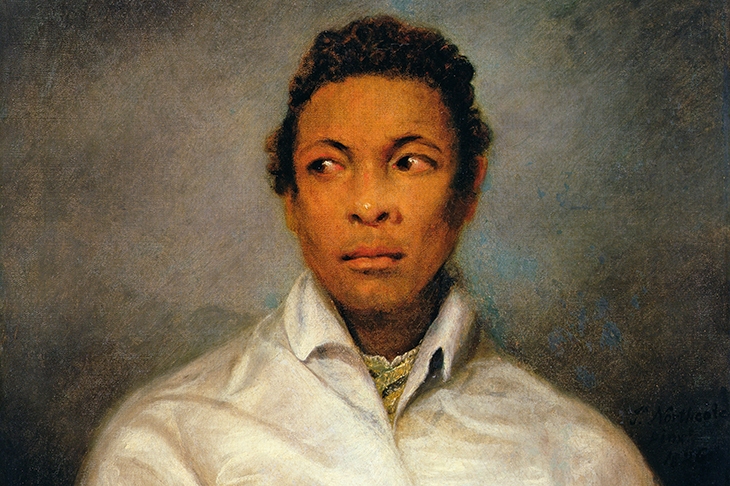In 1824 an ambitious teenage actor fled to England from his native New York where he had been beaten up once too often. He built a career here, being billed as ‘a Most Extraordinary Novelty, a Man of Colour’. What audiences encountered, however, was not the expected comedy of a simpleton mangling the Bard. They got instead an actor of thrilling charisma and deep natural ability.
Ira Aldridge soon became the first black actor to play Othello, taking over the part from the brandy-sodden genius Edmund Kean, who died mid-run due to what one obituary called his ‘vortex of dissipation’. Thanks to a slew of highly prejudiced reviews in London, Ira became a classic example of a tour de force who was forced to tour.
He expanded his repertoire with Shylock, Richard III, Aaron the Moor, Macbeth, and the wonderful Oroonoko — a dramatisation of Aphra Behn’s 1688 novel about an enslaved African prince. He was soon dubbed ‘the African Roscius’ after the legendary Roman actor, although Roscius was born a slave, Aldridge a poor but free man.
Coventry, a proudly anti-slavery city, embraced him and gave the 20-year-old actor the keys to the theatre, which he ran brilliantly for a few months. Last month, 150 years after his death, a memorial plaque was put up where the city’s blitzed theatre once stood. The guest of honour at the ceremony was the Bermudan actor Earl Cameron, CBE, 100 years old. Far from drooling in a care home, Cameron is hot property and regularly on the phone to his agent, having made a recent and triumphant Hollywood comeback in the blockbuster films Inception and The Interpreter.
His screen debut was in the 1951 Docklands heist film Pool of London. It was the first British film to depict interracial love and one of a series of fascinating pictures that Cameron featured in and that shone a light on the murky new subject of racial politics.
‘The difference between me and Ira is that I didn’t come here wanting to be an actor,’ he says down the phone in a rich Bermudan voice. Cameron arrived in England in 1939 as a merchant seaman and by fluke got a job in the chorus of Chu Chin Chow. A stage director complained that his diction was terrible and he was referred to a speech trainer. ‘I wanted to improve my diction, not change my accent. That I wasn’t going to do,’ he chuckles. Incredibly, the speech lady turned out to be Aldridge’s ancient daughter Amanda. She told him stories of her father’s struggles and triumphs.
Ira, it seems, played Lear in white face with white beard, but left his hands defiantly black. His Shylock was a wronged businessman, not the usual red-wigged Jew of stage tradition; he made the villainous Aaron the Moor in Titus Andronicus (‘If one good deed in all my life I did, I do repent it from my very soul’) more sympathetic by re-arranging the text.
Aldridge was a staunch abolitionist and by all accounts a brilliant self-publicist, claiming he was of African royal blood, which was tosh. His reputation grew and he travelled widely on the Continent. He had honours heaped on him by the crowned heads of Europe and was lionised everywhere he went, performing in English even when the rest of the cast didn’t. He married twice (to an English woman and then a Swede) and died in Poland in 1867.
His Othello must have been quite something — the more perceptive reviews suggested he was both tender and brutal, and always utterly human. Shakespeare’s depiction of a happy and very sexual marriage between a black man and his white bride was revolutionary. It sounds as if Aldridge — a ladies’ man, by all accounts — also brought out this aspect in full.
‘The point was not that he was the first black Othello but that he was such a great Othello,’ says Earl, who must surely have had his own troubles working in Britain in a very different age. ‘Actually, you know, racial prejudice never really bothered me. Sure, I had one or two doors slammed in my face while on tour. But I always laughed it off and it never stopped me doing what I wanted to do.’ If you wore a smart suit and were polite, British people were generally accepting, he found. Ira went further. He once declared: ‘Being a foreigner and a stranger are universal passports to British sympathy.’ That proved only half true. The London press gave him utter hell for his colour and his presumption. It was the public who loved him.
Aldridge’s story has been told in a number of recent plays. Black stage actors today know about and feel very protective of his forgotten achievement. As for Earl Cameron, the dearth of good parts was his initial problem. ‘It was not so much prejudice but a failure of imagination by writers and directors. But I am not complaining, not at all. I’ve had a good career, mostly in supporting roles, and enjoyed it.’
Earl never played Othello, to his lasting regret. However, he doesn’t mention that when he was in Coventry for the recent ceremony he went to a Costa Coffee with his hosts. There he stood up and gave an impromptu rendition of Othello’s ‘I have done the state some service’ speech. Apparently, you could have heard a pin drop.






Comments